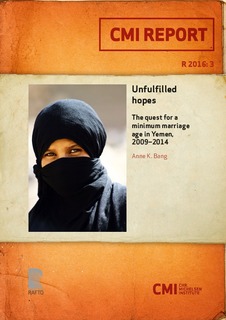Unfulfilled hopes. The quest for a minimum marriage age in Yemen, 2009–2014
Research report
Permanent lenke
http://hdl.handle.net/11250/2475351Utgivelsesdato
2016-05-01Metadata
Vis full innførselSamlinger
- Publications [1488]
Originalversjon
Bergen: Chr. Michelsen Institute (CMI Report R 2016:3)Sammendrag
The project Women’s Human Rights and Law Reform in the Muslim World seeks to map family and criminal law reforms in the period 1995-2015 in Afghanistan, Egypt, Iran, Lebanon, Morocco, Pakistan, Saudi Arabia, Sudan, Tunisia and Yemen. How have women activists in Muslim countries advocated for legal reform in the years since the 1995 Beijing Declaration famously stated that “women’s rights are human rights”? The project is funded by the Rafto Foundation which is a non-profit and non-partisan organization dedicated to the global promotion of human rights. The project is part of an initiative taken by Rafto laureates Shirin Ebadi, Rebiya Kadeer, Malahat Nasibova, and Souhayr Belhassen, and facilitated by the Rafto Foundation to establish a Women’s Network, which is an international network of high-profile and influential women to improve women’s human rights and enhance gender equality in Muslim societies. In supporting local activists and civil society organizations with a common platform, the objective of the Women’s Network is to raise the voices of women in Muslim societies, and to address the religious, legal, social, political and cultural mechanisms that prevent women’s voices from being heard. Note: this text contains romanisation of Arabic, which may render small passages of text unreadable. For a correctly transcribed text, please download the PDF version of this report
